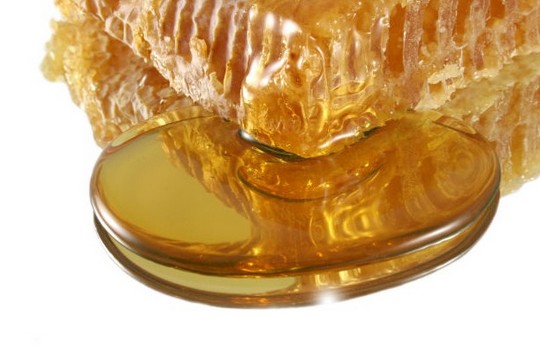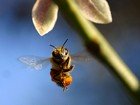Honey Benefits and Manuka Honey - You'll be Surprised!
Honey benefits for
health. Are there any? There certainly are!
Honey helps fertility,
contains vitamins and
minerals and can be
used in
diets, and has been used an old-aged remedy to cure sore
throats
for
years. In fact, there are some many curative properties for
honey, that one could write a book about how good honey is for you.
However, there is also honey that is not good for you.
However, there is also honey that is not good for you.
Poisonous Honey and Non Honey Benefits
Poisonous
honey has been known to exist for thousands of years, and it might
surprise you to learn that poisonous honey can cause headaches, severe
vomitting, abdominal pains, nausea, dizziness and general feelings of
being unwell. This is because the nectar that has been collected has
come from plants that when converted into honey become toxic to the
system.
Plants such as rhododendrons, azaleas, monk's hood all contain glucoside of andromedotoxin. Nectar from leather-leaf and the marsh tea plant will also give you poisonous honey.
Strangely, plants that are known to be poisonous to man such as hemlock, oleander, henbane and foxglove are perfectly safe for nectar collection and honey making.
If you are keeping bees you will to know what bee and honey plants are good to have in your garden, and which aren't. In addition, honey that is heated then kills off the elements that make the honey dangerous to take. However, one has to be careful that the heat produced doesn't end up destroying the honey's organoleptic properties that make it so healthy for us.
Whether you are homesteading, or living in the suburbs you can learn to keep bees which will give you a good supply of pure honey. Beekeeping for Beginners gives you all you need to start your bee hives and for those of you in the suburbs or even in the cities, urban beekeeping is not unheard of. In fact, it is becoming very popular.
Plants such as rhododendrons, azaleas, monk's hood all contain glucoside of andromedotoxin. Nectar from leather-leaf and the marsh tea plant will also give you poisonous honey.
Strangely, plants that are known to be poisonous to man such as hemlock, oleander, henbane and foxglove are perfectly safe for nectar collection and honey making.
If you are keeping bees you will to know what bee and honey plants are good to have in your garden, and which aren't. In addition, honey that is heated then kills off the elements that make the honey dangerous to take. However, one has to be careful that the heat produced doesn't end up destroying the honey's organoleptic properties that make it so healthy for us.
Whether you are homesteading, or living in the suburbs you can learn to keep bees which will give you a good supply of pure honey. Beekeeping for Beginners gives you all you need to start your bee hives and for those of you in the suburbs or even in the cities, urban beekeeping is not unheard of. In fact, it is becoming very popular.

What is in Honey?
Honey is pure glucose and levulose which makes it extremely digestable. In addition to simple sugars, honey contains a number of elements necessary for normal cell, tissue and organ function.Honey Benefits of its Enzymes
Honey has been found to
have the following enzymes: diatase, invertase,
catalase, peroxidase and lipase.
Diatase converts starch and dextrin into sugar. Invertase converts beet and cane sugar into glucose and fructose. Catalase decomposes peroxides. It is said that the reason why honey benefits us is because of the enzymes it contains. However, there are not just enzymes in honey, there are also vitamins.
Diatase converts starch and dextrin into sugar. Invertase converts beet and cane sugar into glucose and fructose. Catalase decomposes peroxides. It is said that the reason why honey benefits us is because of the enzymes it contains. However, there are not just enzymes in honey, there are also vitamins.
Honey Benefits of its Vitamins
What is in honey that
makes
it so healthy? Well for a start honey has a lot of vitamins. In honey
we can find Vitamin B2, B6, B3, H, K, C and some others. Honey is also
an
alkaline food, which is good for those who need to reduce the acidity
in their bloodstream.
Vitamin B2 (Riboflavin) is very important to the system's normal function. Those who don't have enough B2 develop ulcerative colitis, nervous problems, lesions on the skin of the face, eye diseases etc. Honey has as much B2 as chicken meat, 17 x more than fresh apricots, 16 x more than grape juice and fresh apples, and 5 times more than carrots or lean cheese.
Vitamin B6 (Pyridoxine) helps metabolise proteins in the system. Those low on B6 will cause muscular weakness and paralysis, irritability and convulsions.
Vitamin B3 (Pantothenic Acid) helps metabolise carbohydrates.
Vitamin H (Biotin) helps metabolise fats and proteins and their assimilation. Vitamin H helps prevent psoriasis, eczema, herpes, furunculosis.
Vitamin B (Folic Acid) help to maintain a healthy blood supply. It used to cure anaemia.
Vitamin K (antihaemorrhagic) is used to cure stomach ulcers, and heavy bleeding.
Carotene (Precursor to Vitamin A) is essential to the repair to the epithelium cells, vision, and fertility.
Although the vitamin content of honey is small, it is because it is combined with other elements that makes honey so beneficial. Also, it was found that if the honey is filtered and the pollen removed, then most of the vitamins are lost as well.
Honey Benefits in the Chemical Elements
Chemical
elements in honey are: magnesium, potassium, calcium, sodium, iron,
chlorine, phosphorus, sulphur, and iodine salts. Some honey even
contains radium.
An interesting fact about the composition of honey is that in some honey the percentage of some salts in honey is almost equal to their concentration in human blood serum.
An interesting fact about the composition of honey is that in some honey the percentage of some salts in honey is almost equal to their concentration in human blood serum.
Honey Benefits in the Organic Acids
In
addition to the above honey also has organic acids such as malic acid,
tartaric acid, citric acid, lactic acid and oxalic acid.
Finally, honey also has derivatives of chorophyll, xanthophyll, proteins and other substances.
Finally, honey also has derivatives of chorophyll, xanthophyll, proteins and other substances.
Honey Benefits - Anti-bacterial Qualities
Honey, if stored
correctly, can last indefinitely. Because of
its anti-bacterial qualities it was used be the Ancient Egyptians and
Greeks to embalm the dead and honey was known by the Ancient Greeks and
Romans to preserve meat and to improve its flavor.
In times past, people from Ceylon used to cut up meat, dip the pieces into honey, place them in tree hollows and stuff the hollows with leaves and twigs to come back a year or so later to find their meat in perfect condition.
As a result, honey has long been used to place on open wounds and burns for cleaning and healing.
In times past, people from Ceylon used to cut up meat, dip the pieces into honey, place them in tree hollows and stuff the hollows with leaves and twigs to come back a year or so later to find their meat in perfect condition.
As a result, honey has long been used to place on open wounds and burns for cleaning and healing.
Honey Benefits - Antioxidant Qualities
Honey has a number of
flavonoids and phenolic acids that act as
antioxidants. Antioxidants scavange the system and eliminate
free-radicals that may damage healthy cells if not kept in check.
By consuming antioxidant-loaded foods not only can you protect your body from cellular damage, but you can also help slow down the aging process and help slow down the development of degenerative diseases like cancer, heart disease and diabetes.
By consuming antioxidant-loaded foods not only can you protect your body from cellular damage, but you can also help slow down the aging process and help slow down the development of degenerative diseases like cancer, heart disease and diabetes.
Different Types of Honey
However,
all honey is not equal. The percentage of minerals and vitamins vary in
different types of honey. Therefore, the benefits of honey would differ
too. The flavor of the honey will also depend on the nectar that the
bees have been collecting to make their honey.
In Provence, France the honey, miel de lavande, is flavored by the surrounding lavender fields which can be found in great swathes throughout the area.
In Scotland, the honey there is made from nectar from the heather-clad hills and mountains.
In Greece, the honey there is different once again as some of it has been collected from thyme nectar.
In Florida honey comes mainly from the abundant citrus orchards.
In Australia honey comes predominantly from the yellow box and red box flowers.
However, in New Zealand and some parts of Australia is one honey that can set itself apart from the rest, and has now got a reputation as being the best honey there is, and that is Manuka honey.
The type of nectar collected will also result in different colors of honey. Therefore the honey that has come from heather is golden brown, while clover honey is pale yellow.
In Provence, France the honey, miel de lavande, is flavored by the surrounding lavender fields which can be found in great swathes throughout the area.
In Scotland, the honey there is made from nectar from the heather-clad hills and mountains.
In Greece, the honey there is different once again as some of it has been collected from thyme nectar.
In Florida honey comes mainly from the abundant citrus orchards.
In Australia honey comes predominantly from the yellow box and red box flowers.
However, in New Zealand and some parts of Australia is one honey that can set itself apart from the rest, and has now got a reputation as being the best honey there is, and that is Manuka honey.
The type of nectar collected will also result in different colors of honey. Therefore the honey that has come from heather is golden brown, while clover honey is pale yellow.
Health Benefits of Manuka Honey
Manuka
Honey, more particularly, organic
Manuka honey is well-sought
out for its healing properties. Although Manuka honey
orginally came from New Zealand, it is also produced in South-Eastern
Australia where the manuka tree, also known as the tea tree,
grows and it is the manuka flowers from these trees that the
bees feed on that makes this honey so special.
To know whether you are getting real Manuka honey, the color is a dark cream to dark brown. It also has a very distinctive strong flavor that can be very earthy.
So what is it that honey has, that makes it such a great antiseptic and healer?
When the bees collect the nectar from flowers they take it back to the hive and release an enzyme, glucose oxidase, that gets mixed with the nectar and which ends up helping to preserve the honey. When some of the Eqyptian pyramids were discovered, jars of honey 5000 years later were tasted and found to be still perfectly edible!
When honey comes into contact with our warm skin, it is the glucose oxidase that releases the antiseptic hydrogen pyroxide present in the honey that then goes to work fighting any bacteria, but being gentle enough on the skin not to do any damage to the skin tissue itself.
Now, most honeys will do the job, but Manuka honey is far more powerful as it has a higher rate of anti-bacterial qualities. In addition to the hydrogen pyroxide it has what is known as UMF, which is anti-bacterial property that is highly stable.
Now UMF can be found in other honeys, and the higher the UMF rating, the more healing properties the honey has. The UMF property is found in only some manuka flowers, and therefore found in only some Manuka honey. Be aware of this when you buy your honey. Look for the UMF trade mark, and don't be fooled into thinking that because it says Active Manuka Honey that you are buying honey that has the same health benefits as UMF honey, as it doesn't.
In the past, UMF honey was called Active Manuka Honey. However, since using the UMF trade mark this is the sign of a superior product. Active Manuka Honey is often used by bee producers to confuse consumers into thinking they are buying a product that has a high UMF rate, when in fact, it is usually the opposite.
Manuka honey that has a high UMF rate - at least UMF 10 to be ranked as Manuka Honey, and this should appear on the jar label, will be:
To know whether you are getting real Manuka honey, the color is a dark cream to dark brown. It also has a very distinctive strong flavor that can be very earthy.
So what is it that honey has, that makes it such a great antiseptic and healer?
When the bees collect the nectar from flowers they take it back to the hive and release an enzyme, glucose oxidase, that gets mixed with the nectar and which ends up helping to preserve the honey. When some of the Eqyptian pyramids were discovered, jars of honey 5000 years later were tasted and found to be still perfectly edible!
When honey comes into contact with our warm skin, it is the glucose oxidase that releases the antiseptic hydrogen pyroxide present in the honey that then goes to work fighting any bacteria, but being gentle enough on the skin not to do any damage to the skin tissue itself.
Now, most honeys will do the job, but Manuka honey is far more powerful as it has a higher rate of anti-bacterial qualities. In addition to the hydrogen pyroxide it has what is known as UMF, which is anti-bacterial property that is highly stable.
Now UMF can be found in other honeys, and the higher the UMF rating, the more healing properties the honey has. The UMF property is found in only some manuka flowers, and therefore found in only some Manuka honey. Be aware of this when you buy your honey. Look for the UMF trade mark, and don't be fooled into thinking that because it says Active Manuka Honey that you are buying honey that has the same health benefits as UMF honey, as it doesn't.
In the past, UMF honey was called Active Manuka Honey. However, since using the UMF trade mark this is the sign of a superior product. Active Manuka Honey is often used by bee producers to confuse consumers into thinking they are buying a product that has a high UMF rate, when in fact, it is usually the opposite.
Manuka honey that has a high UMF rate - at least UMF 10 to be ranked as Manuka Honey, and this should appear on the jar label, will be:
- Twice as effective as other honey against staphylococcus aureus and eschericihia coli, the most common cause of infected wounds.
- Eight times as effective against helicobacter pylori, the bacteria which causes most stomach ulcers.
- Significantly more effective than other honey against streptococcus pyogenes which causes sore throats.
Honey Benefits and Hayfever
Honey is made from pollen and, as we all know, hayfever is caused by allergies to pollen, so honey seems like an odd cure for hayfever, but it works. Somehow, the tiny amounts of pollen in the honey don't affect the hayfever sufferer. In fact it is the opposite. The pollen in the honey actually desensitizers the allergic reaction over time. Continued use brings relief.It seems that honey harvested locally is more effective than honey that is not harvested locally.
Honey Benefits for Teeth and Mouth
Because honey is
anti-bacterial is is extremely good for treating all
sorts of oral hygiene problems.
If you don't have toothpaste, using honey on your teeth and gums will clean them. Not only that, but the honey will prevent gum disease and prevents the deposit of tarter on the base of the teeth which leads to tooth decay if not removed.
If you suffer from mouth ulcers, applying honey directly to the ulcer as well as gargling with a honey and water mix you will heal your mouth ulcers a lot quicker than by using commercial topical applications.
If you don't have toothpaste, using honey on your teeth and gums will clean them. Not only that, but the honey will prevent gum disease and prevents the deposit of tarter on the base of the teeth which leads to tooth decay if not removed.
If you suffer from mouth ulcers, applying honey directly to the ulcer as well as gargling with a honey and water mix you will heal your mouth ulcers a lot quicker than by using commercial topical applications.
Honey Benefits for Asthma Sufferers
If you suffer from
asthma you can use honey for relief. You
can take honey orally by either mixing a couple of spoons in either
water or milk and drinking it twice a day for relief.
In addition to this you can put half a cup of honey in a small basin of hot water. Make a towel tent over your head and breathe in the honey steam.
In addition to this you can put half a cup of honey in a small basin of hot water. Make a towel tent over your head and breathe in the honey steam.
Honey Benefits for Stomach Disorders
Honey is firstly a
laxative, so can be take by those suffering from
constipation. Mix 2 teaspoons in a glass of warm water and take 3 times
a day until condition passes.
The regular intake of honey helps tone the stomach muscles and aids in digestion. Because it helps in stabilizing the amount of hydrochloric acid that the stomach makes honey is good for reducing heartburn, nausea and vomitting.
Honey also has the ability to absorb moisture enabling it to kill bacteria and clear up infections in the stomach.
Taking a cup of beet juice mixed with 1 tablespoon of honey every day before breakfast will help cure a gastric ulcer.
Honey also contains minerals that are essential for good health, and for this reason, is often recommended as a daily tonic.
The regular intake of honey helps tone the stomach muscles and aids in digestion. Because it helps in stabilizing the amount of hydrochloric acid that the stomach makes honey is good for reducing heartburn, nausea and vomitting.
Honey also has the ability to absorb moisture enabling it to kill bacteria and clear up infections in the stomach.
Taking a cup of beet juice mixed with 1 tablespoon of honey every day before breakfast will help cure a gastric ulcer.
Honey also contains minerals that are essential for good health, and for this reason, is often recommended as a daily tonic.
The Benefits of Honey and Perspiration
If you suffer from excessive
sweating
you can find relief with honey. However, it has to be active Manuka
honey for it to work successfully.
Take 2 teaspoons of Manuka honey with 2 teaspoons of organic cider vinegar with the "mother". Braggs make an excellent cider vinegar for this. Fill up a mug with warm water and drink this 3 times a day. Use a straw as the vinegar will strip the enamel off your teeth.
Take 2 teaspoons of Manuka honey with 2 teaspoons of organic cider vinegar with the "mother". Braggs make an excellent cider vinegar for this. Fill up a mug with warm water and drink this 3 times a day. Use a straw as the vinegar will strip the enamel off your teeth.
The Benefits of Honey for Losing Weight
How
many people have been on this food diet and that crash diet to lose
weight. Honey is used by
those trying
to lose weight as it is
assimilated
more quickly than other sugars. Mix a little honey with cider vinegar
and taken regularly many swear that they lose 2-3 kilos
a week
with
this concoction.
Health Benefits of Honey and Coughs
An old homemade
remedy has been taking 1 tablespoon each of honey, lemon juice and
glycerine for sore
throats and coughs.
Another is making a hot toddy of
whiskey and a tablespoon of honey for colds, as well as to relax the
mind and body after a stressful day.
The Benefits of Honey as Instant Energy
Athletes
know that taking honey while training or during strenuous exercise
actually gives one instant
energy.
Therefore this is a great food to
pack if you are going climbing or hiking for a quick snack and an
energy booster.
However, don't just use honey for special occasions. A teaspoon of honey a day is excellent for those who are feeling constantly tired with low levels of energy.
However, don't just use honey for special occasions. A teaspoon of honey a day is excellent for those who are feeling constantly tired with low levels of energy.
The Benefits of Honey for Fertility
It is said that honey aids with fertility as well as overcomes impotency.The Benefits of Honey for Burns, Wounds and Leg Ulcers
Honey
is a wonderful first aid treatment for burns and cuts as it is a natural
antiseptic. If you
cover burns with honey the skin
will
not
blister as badly, and cuts will heal with little pain or swelling.
Any open wound or leg ulcer that has been difficult to heal will heal rapidly with honey, as long as it is pure honey. Honey speeds up the healing process due to the fact that it contains properties that stimulate the blood circulation on the edges of wounds.
Any open wound or leg ulcer that has been difficult to heal will heal rapidly with honey, as long as it is pure honey. Honey speeds up the healing process due to the fact that it contains properties that stimulate the blood circulation on the edges of wounds.
The Benefits of Honey as a Natural Beauty Treatment for your Skin
Honey
has long been included in the making of soaps and other natural
homemade beauty products. The
vitamins and minerals in the honey
nourish and moisturize the skin. Mix honey with oatmeal
or
bran,
and
your skin will be more elastic than usual. Mix some honey with olive
oil after your shower. Leave it on for 10 minutes, and then remove.
Your skin will feel lovely and soft.
Mix honey and egg whites together to soothe tired eyes. Mix honey with lemon juice or apple cider and use it as an astringent for oily skin.
Another benefit of honey is for those using it for rosacea. Mix the honey with a little rain water or spring water to loosen it. The spread it over the affected area. Leave for 3 hours, and then rinse off. Within 2 weeks you should notice the difference.
Mix honey and egg whites together to soothe tired eyes. Mix honey with lemon juice or apple cider and use it as an astringent for oily skin.
Another benefit of honey is for those using it for rosacea. Mix the honey with a little rain water or spring water to loosen it. The spread it over the affected area. Leave for 3 hours, and then rinse off. Within 2 weeks you should notice the difference.
Honey as a Face Mask
Honey masks on your skin
have a number of benefits. This is because
honey is a natural humectant, meaning that it draws free water from
deep within the cells and brings it to the surface of the skin. As a
result, any honey mask that you use on your face and skin will make
your skin plump and will temporarily iron out fine wrinkles.
Honey masks will also rehydrate dry skin and help red, irritated areas. As a result, honey masks are excellent for treating acne and skin blemishes. Use the recipes below twice a week for good results.
A simple honey mask is just using 2 teaspoons of organic honey on your face. Leave for 20 minutes and rinse with warm water.
Another honey mask using honey and milk is to take 2 teaspoons organic honey and 2 teaspoons full milk or whole cream. Warm slightly in a microwave. Place on face for 20 minutes. Rinse off with warm water.
Honey masks will also rehydrate dry skin and help red, irritated areas. As a result, honey masks are excellent for treating acne and skin blemishes. Use the recipes below twice a week for good results.
A simple honey mask is just using 2 teaspoons of organic honey on your face. Leave for 20 minutes and rinse with warm water.
Another honey mask using honey and milk is to take 2 teaspoons organic honey and 2 teaspoons full milk or whole cream. Warm slightly in a microwave. Place on face for 20 minutes. Rinse off with warm water.
Honey Benefits in Baking
We all know that white
sugar is deadly. Not only can you substitute
sugar for
honey in your tea, coffee and on
your cereal, but you can
also
substitute sugar for honey in baking.
Use the same amount of honey as you would for sugar, but reduce the liquid content by a quarter. For example, if a recipe calls for 1/2 cup sugar and 1 cup milk, use 1/2 cup honey, but only 3/4 cup milk.
Also, the honey seems to have a slightly acid reaction that will upset the balance of baking powder or self-raising flour. To overcome this, when completely substituting honey for the sugar in a cake recipe, add half a teaspoon of bicarbonate of soda for each cup of honey used in the recipe.
Note, that food baked with honey will brown faster, and therefore should be baked at a lower temperature - at 20°C less than the recipe says.
Use the same amount of honey as you would for sugar, but reduce the liquid content by a quarter. For example, if a recipe calls for 1/2 cup sugar and 1 cup milk, use 1/2 cup honey, but only 3/4 cup milk.
Also, the honey seems to have a slightly acid reaction that will upset the balance of baking powder or self-raising flour. To overcome this, when completely substituting honey for the sugar in a cake recipe, add half a teaspoon of bicarbonate of soda for each cup of honey used in the recipe.
Note, that food baked with honey will brown faster, and therefore should be baked at a lower temperature - at 20°C less than the recipe says.
Health Benefits of Honey in Jam Making
Using honey instead of
sugar is preferable as you only end up using
half the normal sugar needed.
Here is an Easy Jam Recipe using Honey:
3 pounds fruit
1.5 pounds honey
juice of 1 lemon
Cut up the fruit, discard the stones or seeds. Cover with the honey and let to soak overnight. In the morning add some lemon juice and boil until it jells when dropped on a cold saucer. This is a good recipe using plums, peaches, or apricots. By adding a few drops of oil or a small bit of butter scum will be prevented from forming when cooking the jam.
Using Honey to Make Fruit Sauces:
If you want to make a sauce use peeled but whole plums, peaches or apricots with the stones still in the fruit. Use the same fruit to honey ratio as the jam recipe, but add a bottle of cider vinegar to the mixture, plus a teaspoon each of your favorite spices such as ginger, cayenne, all-spice, cloves etc. Boil together for half and hour, or until the stones separate from the fruit. Rub through a strainer with the back of a spoon, boil briefly again and bottle.
Here is an Easy Jam Recipe using Honey:
3 pounds fruit
1.5 pounds honey
juice of 1 lemon
Cut up the fruit, discard the stones or seeds. Cover with the honey and let to soak overnight. In the morning add some lemon juice and boil until it jells when dropped on a cold saucer. This is a good recipe using plums, peaches, or apricots. By adding a few drops of oil or a small bit of butter scum will be prevented from forming when cooking the jam.
Using Honey to Make Fruit Sauces:
If you want to make a sauce use peeled but whole plums, peaches or apricots with the stones still in the fruit. Use the same fruit to honey ratio as the jam recipe, but add a bottle of cider vinegar to the mixture, plus a teaspoon each of your favorite spices such as ginger, cayenne, all-spice, cloves etc. Boil together for half and hour, or until the stones separate from the fruit. Rub through a strainer with the back of a spoon, boil briefly again and bottle.
Did you find this page helpful?
Sharing is a way of saying, "Thanks!"
Follow Us and Keep Up to Date
Other Resources on Bees and Honey that you May be Interested In
Go from Honey Benefits back to
Beekeeping for Beginners
Go to Beekeepers Calendar
Go to Urban Bee Keeping
Go to Honey Plants
Go to Beekeepers Calendar
Go to Urban Bee Keeping
Go to Honey Plants
Send us Your Comments
If
you would like to add value to this page and add more info to it on the
benefits of honey that you have found, please add them here.
Leave a Comment
Do you have anything that you would like to add after reading this page? We would love to hear your thoughts. If you can add additional information to what has been written here you will be adding value to the website! No need to have any special skills - just type and submit. We will do the rest!










New! Comments
Do you have something of value to add? Leave me a comment in the box below.